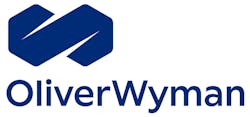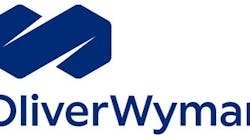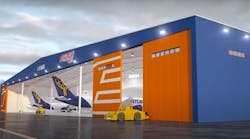Aviation maintenance, repair, and overhaul sector (MRO) spend will approach $80 billion in 2022 and come close to matching pre-COVID levels in 2023; however, the industry is facing significant challenges according to Oliver Wyman's Annual MRO survey, titled "The Quest for Stability."
"The MRO industry has displayed remarkable resilience during the past two years, but it may not be enough as it faces a new set of challenges around labor, inflation and sustainability," said Brian Prentice, a partner with Oliver Wyman.
Labor
The need for pilots is well known, but another critical segment of the industry could keep planes from flying. A lack of technical staff was cited as the top disruptor for the MRO industry over the next five years. Some 80% of North American respondents said that finding mechanics and technicians has become challenging, with Europe (65%) and other geographies (79%) feeling a similar strain. The challenge of securing labor has become critical, with more than half of survey respondents reporting that the lack of labor is already beginning to constrain growth – even with demand not yet fully at pre-pandemic levels.
COVID brought about a wave of retirements and fewer new people are entering the industry. While apprentice programs and technical school partnerships continue to work well as traditional recruitment tools, it is not enough to combat the overall talent shortage.
Inflation
Survey respondents ranked labor/material cost management as the second top disruptor facing the industry. Some 60% of respondents anticipate that materials costs will increase by more than 5%. North American respondents expect the largest inflation in labor costs, with 59% expecting increases of 5% or more.
"In an inflationary environment with a tight labor market, MROs over the next few years will be looking for any way to offset labor and material costs," said Derek Costanza, a partner with Oliver Wyman. "To complicate matters, the industry will be trying to do this when consumer travel demand is rebounding rapidly."
Sustainability
Almost all (90%) survey respondents indicated that sustainability is a priority for MRO-related activities. More than three-quarters expect sustainability to become an area of high focus and report that their companies have sustainability targets in place.
Despite the industry's commitment, most sustainability concepts are still in the early stages. The most widely used strategy is recycling, followed by measuring greenhouse gas emissions and reducing direct material inputs. Overall, the industry expects sustainability to become a required cost of doing business rather than a pricing differentiator. But sustainability is also impacting talent recruitment and retention efforts.
"At a time when the concept of how and where people work has radically changed, MRO leaders need to engage and attract a new generation of workers -- who value quality of life and are very concerned about climate change. It will be a tough sell," concluded Prentice.
The report concludes with five things the aviation MRO industry must focus on moving forward, including: a clear outlook on future labor plans, creative ways to attract and retain talent, mitigating cost increases, increasing labor efficiency, and meeting customer and investor sustainability demands.
About the Survey
In its second decade, the annual Oliver Wyman MRO survey is an industry standard that samples the attitudes and strategies of executives from across the aviation industry, as they address key trends and emerging issues in the maintenance, repair, and overhaul sector. In this year's survey, we focused on the continuing challenges of labor shortages, cost management, and sustainability. The survey leveraged the latest Oliver Wyman Global Fleet and MRO Forecast to provide additional insights.




